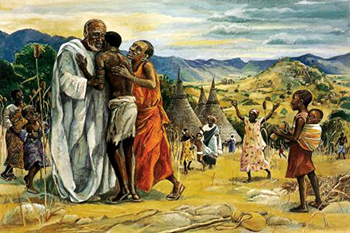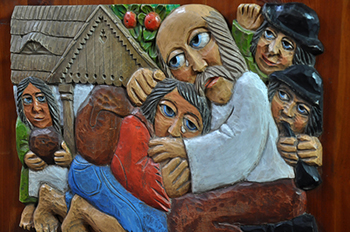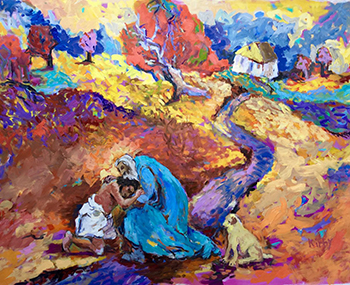For Sunday March 27, 2022
Lectionary Readings (Revised Common Lectionary, Year C)
Joshua 5:9-12
Psalm 32
2 Corinthians 5:16-21
Luke 15:1-3, 11b-32
We can be loved and lost at the same time. We can be deeply loved, and deeply lost at the same time. I know that I’m stating the obvious, but for me, this fact about the world — this fact about the life of faith — remains a heartbreaking mystery. I wish it weren’t true. I wish there were no gaps between God’s astounding love, and our capacity to perceive it, lean into it, and trust it. I wish the pieces of the cosmic equation — God’s love, our freedom, God’s otherness, our brokenness, God’s timing, our impatience — were different enough to yield a cleaner, easier, more straightforward result. But no. We can be loved and lost at the same time.
"There was a man who had two sons." So begins one of Jesus’s best-known stories about love and lostness. I was a little girl in Sunday School when I first heard the parable, and ever since then, I have wondered about the ways we can live inside the objective reality of God’s love, and still feel restless, hopeless, angry, and abandoned. I've wondered about God's incomprehensible restraint, which allows this to be the case. I've wondered about the barriers that remain in my own heart, blocking me from experiencing the love I know is real.
Some years ago, I wrote letters to the two sons, hoping to explore each one’s particular version of lostness. Where did the gap appear for the boy who ran away? Where did it manifest for the boy who stayed home? What happened to interrupt the flow of love between these all-too-human sons, and the father who offered them everything?
As I read over those letters this week, they still felt like the most honest responses I can offer to Jesus’s famous parable. So here are the letters I wrote about the shapes and forms of lostness. The lostness of two storied sons — and mine, too.
To the Boy Who Ran:
I begin with you, because you're the strangest and least accessible to me. My temptation is to judge you from the get go: Impetuous. Careless. Demanding. So selfish, you take my breath away.
At first glance, you and I have little in common. I've never run away, or squandered an inheritance, or given myself over to “dissolute living.” But neither have I felt the ardent, tear-soaked embrace of a lovesick father — human or divine — welcoming me home. Maybe this is why I dislike you. Am I envious because God is generous? Am I hurt because the father's love is a wild, unfettered thing, unpredictable and unfair? Yes, I am. YES. I AM.
There are so many things I’d like to know about you. Was your penitence genuine? Did you mean that pious speech you composed in the pig sty, or were you just a clever talker who knew your father’s soft spots? Did you feel bad about your adventure, or just bad that it failed?
What about after you returned home? Did you get your act together, once the party was over and the fatted calf was eaten? Did you get up early the next morning and pull your weight in the fields? Did you apologize to your brother? Take care of your father? Make peace with the villagers you scandalized? Did you understand that repentance is more than a teary speech? Did you understand that everything — everything — would have to change?
 |
Here's what I really need to know: what is this bitter root in me, that craves a guarantee? That wants to make sure you understand just how much fear, destruction, and sorrow you caused, before I let you off the hook? Why do I need to withhold the forgiveness that might restore you? What will I gain if you bleed repentance first?
I know that this is a problem. My spite. My withholding. Everything in me accuses you of having no empathy — of not giving a damn that you ripped your father's heart out of his chest — but the truth is, I’m struggling pretty hard to empathize with you. So I'm digging down, trying hard to find the tender places where you really live. Who are you beneath the labels? Beneath "prodigal," beneath “selfish,” beneath "sinner?"
"Dying of hunger." That's how your story describes your final days in that far-off country. When your costly adventure was over, when your funds ran dry, when your so-called friends abandoned you. There among the pigs, covered in filth, you finally realized who and what you were. "Dying of hunger." May I give you a new label? A new name? One I can relate to? Aren't you, at the very core, The Hungry One?
It was hunger, wasn't it, that first lured you away from a good life and a good father? A gluttonous hunger, maybe, but hunger still. For freedom? Self-expression? Novelty? Something in you — something wild and insistent — needed feeding.
But here’s the thing that knocks the breath out of me: your father, in his vast, unorthodox wisdom, understood. He didn’t hold you back. He didn’t decide what your journey should look like. He loved you so much, he let you go.
What did he know that I refuse to know? That you couldn't return home without leaving first? That you couldn't taste resurrection without dying? That maybe lostness is part of the deal — the prelude to the most magnificent finding? Can it be that I, too, need to know such hunger — know it on the tongue, in the gut, like a fire in my bones — before I can savor the feast?
The father understood. What a remarkable thing that is — his deep and patient comprehension of how life and desire actually work. He respected the hunger that pulled you away. He knew a wiser, sharper hunger would bring you home.
Was it admirable, what you did? I don't know. But there is this: even though it cost you, even though it wounded your family, you honored your hunger. I can't speak to the rightness or wrongness of your decision, but maybe there is something in it that I should attend to. I usually ignore my hunger. When I can't ignore it, I hide, minimize, and vilify it. Is there a chance my hunger wants to point me to God?
Your journey ends in a passionate embrace. Unrestrained welcome, overflowing joy. Were you grateful? Were you indebted? Did you try extra hard in later years to earn the feast your father lavished on you? Or did you simply rest in his prodigal love, knowing it could never be earned? It seems your father didn't care one way or the other; he just wanted to feed and clothe you.
There's so little of your experience I can applaud. Despite my best attempts to reconcile my heart with yours, my envy remains. Your father ran to welcome you. He cared for nothing in this world so much as having you safe and snug in his arms. No matter what the preachers say, this is not everyone's visceral experience. To hear we are loved is one thing. To feel ourselves embraced is another. You are fortunate. Do you know that? Something jealous in me wants to make sure you know it.
 |
But something broken in me wants to reach you, too. To build bridges between your life and mine. What do you know that I know, too? I know what it's like to hunger. To hunger for life, for depth, for passion, for joy. I know what it's like to imagine an exotic Elsewhere, a more perfect nourishment miles away from my father's all-too-familiar table. I know lostness — the lostness of being small, sorry, and stupid in a world too big and unwieldy to manipulate or control. I know what it's like to "come to myself" in the broken, impoverished places I create in my own heart. And I know what it’s like to feel shame — shame that I’ve disappointed everyone, shame that I’m damaged goods, shame that I’ll never, ever be enough to earn the love I crave.
I still don't like you. But maybe we're not so very different after all.
To the Boy Who Stayed:
I won't lie; my sympathies are with you. Your story haunts me. Your resentments mirror mine. Whenever I think of you standing — appalled — outside your father's house, your brother's easy laughter ringing in your ears, I ache inside. I imagine you sore and sweat-stained after a day in the fields, longing to go inside for a shower, a meal, a bed. Longing for so many legitimate things — only to be thwarted by a robe, a ring, and a fatted calf. Not intended for you.
Theologians tell me I'm supposed to look at you and see self-righteousness, arrogance, and unholy spite. But I don't; I look at you and see pain.
I'm an oldest kid, too. I’m used to being responsible, staying home, and getting things done. By temperament, I'm careful, I like order, and I don't mind work. But I'm a stickler about fairness. I care about fairness a lot.
I am also a seether. I don't confront; I seethe. Just like you.
Here are my questions: how long did the bitterness fester? How many weeks, months, or years did you suffer in silence, mistaking restraint for righteousness? Did your father shrink in your eyes as your anger grew? Did every word he spoke, every request he made, every sigh he sighed, grate on your nerves? Did you lie in bed at night and wish you'd had the audacity to leave like your brother did?
Or maybe it was another kind of courage you lacked. The courage to cry? To plead? To confess a need so insatiable and so secret, it made you burn with shame?
What would have happened if you'd looked your father in the eye and said, "Yes. I know that all you have is mine. But it's not enough. I can't fathom why, but your "everything" is not enough for me. I can't find contentment. I can't make my way to love. Somehow, in your very presence, I am lost."
I know these are terrifying things to admit to yourself, much less to say out loud. But what if you had said them? What if you had said, "Something in me is broken. Something in me can’t embrace or enjoy what's mine. Something in me doesn’t understand the joy that lives in giving myself away. Please help me. Wrap your arms around me. Hold me. I am full of hatred — for myself most of all. Please teach me how to love."
The challenge of your story — the challenge that tears at me — is that you had rightness on your side. You were right to call for justice. Right to ask why your brother's sins incurred no consequences. Right to ask why your own loyalty seemed to count for so little.
You were right to find your father's version of love a bit much, a bit scandalous, a bit risky. Because it is. You've understood the point of your own story better than anyone. Yes, your brother squandered his inheritance. Perhaps, by hoarding and withholding, you also squandered yours. But the real Prodigal in this story is your father, is he not? Over-the-top, undignified, and hair-raising in his love? Of course you are right to be appalled.
 |
Here’s the hardest thing: I don't know why your father never gave you a young goat. Or threw you and your friends a spontaneous party. I wish with all my heart he had; it makes me angry that he didn't. Was he waiting for you to ask? Were you, in turn, waiting for him to initiate? I know that mingy, self-protective mindset so well: "If I have to ask for it, then it doesn't count."
Maybe it does. Maybe there is something essential to be learned in the asking.
"We have to celebrate and rejoice." This is your father's final word to you as you stand out in the cold, your arms crossed, your fists clenched, your heart bleeding. Did you know that, dutiful firstborn? Did you know you have to celebrate? Did you know that joy is a must in your father's house? That partying is a duty?
How astonishing that you lived within arm's reach of your father all these years, and never glimpsed the merriment that is at his core. "We have to celebrate and rejoice." He insists. But there you stand, lover of justice. One hundred percent right — and one hundred percent alone.
What will it take for you to lean into celebration as a teacher? To try out mercy as a balm? Some lessons can only be learned as you laugh and dance. Some hearts will only be healed at the feast.
Here's your vindication, yours and mine: the power in this story is the older child’s. It’s yours. Your brother has gone inside; he's done breaking hearts for the time being. Now your father stands in the doorway, waiting for you. Waiting for you to stop being lost. Waiting for you to come home. Waiting for you to take hold at last of the inheritance that has always been yours.
Did you know that your choices are so powerful? You get to write this ending. You get to write this ending.
It's getting cold outside. The sun is setting, and the party beckons. What will you do, as the music grows sweeter? What will we choose, you and I?
Debie Thomas: debie.thomas1@gmail.com
Image credits: (1) Vanderbilt University Library; (2) Vanderbilt University Library; and (3) KirbyKendrick.com.





